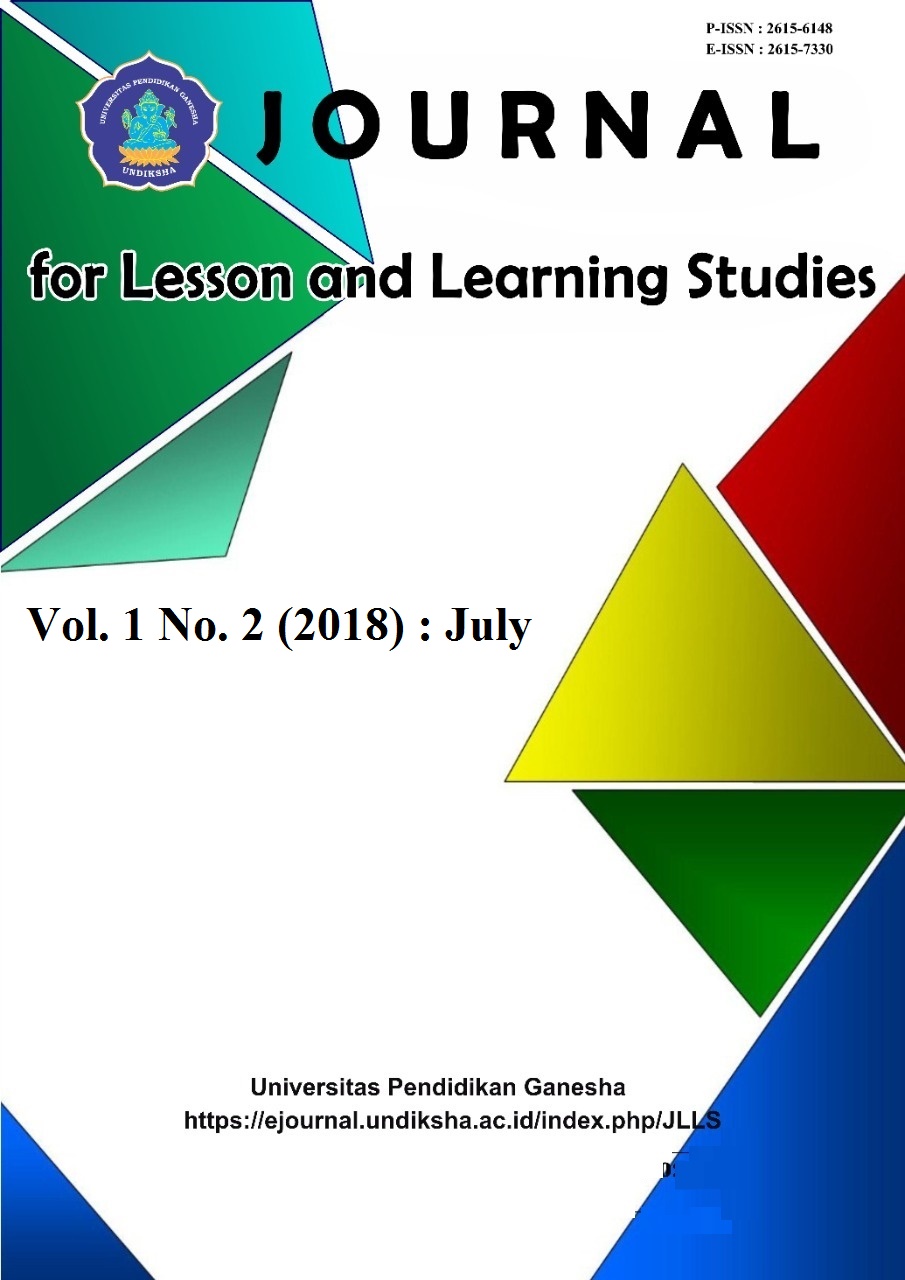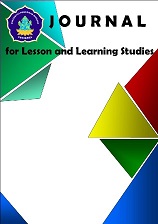PENGARUH MODEL PEMBELAJARAN TEAM ASSISTED INDIVIDUALIZATION BERBASIS PENILAIAN KINERJA TERHADAP KOMPETENSI PENGETAHUAN MATEMATIKA SISWA KELAS V SD GUGUS II KUTA UTARA TAHUN PELAJARAN 2017/2018
DOI:
https://doi.org/10.23887/jlls.v1i2.14717Abstract
This research aimed to determine the influence of learning model team assisted individualization, based dreaded performance against the competency knowledge mathematic students of class V elementary school Gugus II Kuta Utara in the academic year 2017/2018. This research is an experimental research with the research design is quasi-exsperimental design ( nonequivalent control group design). The population in this research is all class V elementary school Gugus II Kuta Utara in the academic years 2017/2018 as many as 334 students. Research sample is determined by random sampling technique. The sample in this research is class V elementary school No. 3 Canggu as experimental group and class VB elementary school No. 1 Tibubeneng as control group. That amounts 66 students. The mathematic knowledge competence control data is collected with instruments in the from of multiple choice test. Than the data is analyzed by t-test. The result of the analysis shows that there is a significant difference of mathematic knowledge competence among group of students who are tought using learning model team assisted individualization based dreaded performance and teach using konvensional learning on the students class V elementary school Gugus II Kuta Utara academic year 2017/2018. This is evidenced by the Tcount of = 4,072 > Ttable = 2,000 at the significant level of 5% with DK = n1+n2-2 (33+33-2=64). Similary the average score of knowledge competence of mathematic student experimental group = 75,71 > = 61,00 average of mathematic knowledge competence of control group students. This it can concoulde that the application of model team assisted individualization based dreaded performance against of competency mathematic knowledge students class V elementary school Gugus II Kuta Utara academic yesrs 2017/2018.References
Darmadi, Hamid. 2011. Metode Penelitian Pendidikan. Bandung: Alfabeta.
Depdiknas. 2003. Kurikulum 2004 Standar Kompetensi untuk Kelas V Sekolah Dasar. Jakarta: Depdiknas.
Fahturrohman, Muhammad. 2015. Model-Model Pembelajaran Inovatif. Yogyakarta: Ar-Ruzz Media.
Kosasih. 2014. Strategi Belajar Dan Pembelajaran. Bandung : Yrama Widya
Merudewi, I.G. A. Kencana. 2014. Pengaruh Model Pembelajaran Kooperatif Tipe TAI (Team Assisted Individualization) Berbasis Peta Konsep Terhadap Hasil Belajar IPS Siswa Kelas V SD Gugus VIII Sukawati. Jurnal: Undiksha.
(Diakses dari https://ejournal.undiksha.ac.id/index.php/JJPGSD/article/view/1917 Pada tanggal 27 Februari 2018 jam 15.20)
Nurissa, Dwi Setia. 2016. Pengaruh Model Pembelajaran Kooperatif Tipe Team Assisted Individualizaion (TAI) Terhadap Hasil Belajar Mata Pelajaran Matematika Kelas IV Siswa Kelas IV SD Muhammadiyah Karangharjo Berbah Sleman. Skripsi: Universitas Negeri Yogyakarta. pdf.(Diakses dari https://skripsi.Yogya.ac.id/index.php/JJPGSD/article/ Pada tanggal 12 Februari 2018. Jam 15.16)
Pramana, I Nyoman Arya. Pengaruh Model Pembelajaran Team Assisted Individualzation Berbasis Nilai-Nilai Karakter Terhadap Hasil Belajar IPS Kelas IV. Jurnal: Undiksha. pdf.(Diakses dari https://ejournal.undiksha.ac.id/index.php/JJPGSD/article/view/1917 Pada tanggal 27 Februari 2018 jam 16.10)
Sugiyono. 2013. Metode Penelitian Pendidikan Pendekatan Kuantitatif dan Kualitatif, dan R&B. Bandung: Alfabeta.
Sugiyono. 2014. Metode Penelitian Pendidikan Pendekatan Kuantitatif dan Kualitatif, dan R&B. Bandung: Alfabeta.
Supardi. 2015. Penilaian Autentik. Jakarta: Rajawali.
Sohimin, Aris. 2014. 68 Model Pembelajaran Inovatif dalam Kurikulum 2013. Yogyakarta: Ar-Razz Media.
Downloads
Published
How to Cite
Issue
Section
License
Authors who publish with the Journal for Lesson and Learning Studies agree to the following terms:
- Authors retain copyright and grant the journal the right of first publication with the work simultaneously licensed under a Creative Commons Attribution License (CC BY-SA 4.0) that allows others to share the work with an acknowledgment of the work's authorship and initial publication in this journal.
- Authors are able to enter into separate, additional contractual arrangements for the non-exclusive distribution of the journal's published version of the work (e.g., post it to an institutional repository or publish it in a book), with an acknowledgment of its initial publication in this journal.
- Authors are permitted and encouraged to post their work online (e.g., in institutional repositories or on their website) prior to and during the submission process, as it can lead to productive exchanges, as well as earlier and greater citation of published work. (See The Effect of Open Access)





